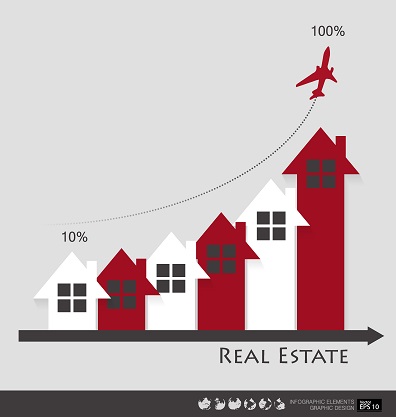Category: Real Estate
The Real-World Conference has established itself as the go-to conference for the real-estate industry, attended by a host of industry leaders, resource persons, and key movers and shakers in the real estate and property management space. The latest edition of this premier realty and property meet, which took place between 16th July and 18th July 2017 at the Wynn Hotel in Las Vegas, USA, lived up to its tagline of “a sign of good things to come.” The host of informative sessions, roundtables, and training workshops on offer, by industry leaders and topic specialists, enriched participants with rich insights on the latest industry trends, training on valuable skill-sets, and exposure to practical case studies applicable to real properties.
Related post: Top Tech disruptors in the Real Estate industry – What to implement first
Enriching Sessions Keep Participants Up-to-Date
The RealWorld conference is noted for its host of innovative sessions, and RealWorld 2017 was no different. Several sessions, dealing with customer experience, marketing, internal processes, leasing, risk management, and more, offered a host of valuable resources for those in the property business.

A session on “Accounting & Asset Investment Management, Financial Solutions to Run Your Business” offered insights on the tools required to support relationships, effective reporting, and diverse technology unique to the business. It reviews a host of solutions designed specifically for real estate investment firms and asset management professionals, including what’s new.
Another intuitive session “The Latest in Commercial Property Management and Portfolio Asset Management Solutions” offered insight on the right tools and techniques to make sense of the wealth of incoming data every day, how to collect the most relevant data, how to consolidate and analyze the information in shared reports, and more.
The latest trends such as daily pricing, complex floor plans, and internet listing services make the time-honoured practice of keeping track of competition a very complex task. The “session on Tracking Your Comps” offered valuable information on the most relevant best practices and methods, and overview of the new tools which allows coping with new challenges, how to use data efficiently, and much more.
Related post: Infographic on Impact of Big Data in Real Estate
Another session, “Splitting the Atom: Using Data Science to Delineate and Turbocharge Marketing & Sales” offered rich insights on how to evaluate the quality of leads, how to use business intelligence in decision-making the right way, and more.
Yet another session which stood out was an educational session, where multi-family panelists interacted with apartment residents from the greater Las Vegas area. Property managers gained valuable insights on real-world scenarios related to what renters want, the impact of communication and reviews have on leasing and renewal decisions, and much more. Another standout session brought together residents and managers, discussing the issues related to safety, noise, parking and social interaction in property spaces.
These sessions, apart from providing property managers and other stakeholders with rich insights on real life practical issues and grouses of apartment residents, also drives home a point of how a community portal, used the right way, could strengthen the bond between landlord and renter. Today’s residents expect real-time conversations and instant decisions related to critical issues that matter, in the communication mode of choice. The speed and nature of the property management’s response to such issues and requests can have a big say in rental renewals and even new referrals. In such a scenario, a platform that allows identifying and tackling critical issues in a much more systematic and coherent manner, as opposed to public grumbling in social media sites, is invaluable.
Exhibitions Help Participants Stay Aware and Use New Technologies
Apart from a host of informative sessions, RealWorld2017 also features several top exhibitors, offering insights on new ways of doing things, path breaking innovations in the industry, products, and solutions to improve productivity and save money, and overall become more efficient. The exhibition connected to the event offers a ready source of access to the latest and the most advanced products and providers in the real estate space.
Networking in the Name of the Success Game
Apart from enriching themselves with the latest knowledge, insights, trends, and best practices, participants also gain through networking with the top industry leaders, peers, service providers, and other stakeholders in the industry. Participants get a valuable break to kick-start a fruitful relationship with key contacts that matter and sustain the engagement through social media and other industry portals. The RealWorld conference also offers valuable opportunity to build on existing relationships. Smart participants use the time to reconnect with their previous contacts over a cup of coffee.
Most conferences run for a couple of days, and participants with a goal to introduce themselves to, say 10 people each day, providing some encouragement to speakers and presenters when running into them outside of the sessions, and connect with big shorts during the social events connected with the conference, when they are in a more relaxed setting.
However, amid all the potential is the danger of going overboard. The sheer volume of sessions makes it physically impossible for participants to attend all sessions, and participate in all events. Participants would gain maximum value by researching each event, to pick and choose the events and sessions that really matter to their line of business and position in the industry. Participants have the luxury of checking out the social media presence of the key speakers, identify their strengths, and attend the break-out sessions with the most relevant speakers.
Networking and keeping oneself updated is the name of the game when it comes to success in real estate. Attending conferences such as RealWorld is worth its weight in gold for real estate agents, managers, and other key stakeholders. Regardless of whether you attended or missed out on the 2017 session, reserve your seat for RealWorld 2018, scheduled between July 15 and July 17, 2018, at the Wynn Las Vegas.
In the meantime, real estate players would do well to translate the insights gained into action. A big part of such action is implementing state-of-the-art digital and mobility solutions to offer a better experience for customers, and making internal processes transparent and seamless.
Stay up to date on what's new

Featured Blogs
Stay up to date on
what's new



Talk To Our Experts
The relentless advancement of technology force a churn in many industries and the real estate sector is no different. As it is with most positive disruptions, technology facilitates doing things faster, cheaper, and more efficiently.
Online Services Make Processes Easy and Efficient
Many businesses have shifted entirely online, and other businesses facilitate online mode in a big way. Hitherto, the online component of real estate services has been mainly limited to property searches. However, things are changing, both in depth and scope.
Easy and seamless solutions are now available to conduct the entire process, right from property search to signing agreements online. Virtual Reality and Augmented Reality technology enable making virtual site visits, with annotations that offer even greater insights than an actual site visit would deliver. Collaborative suites make negotiations between agents, property owners and tenants easy, and methodical. Integrated payment options allow the tenant to make deposits and rents seamlessly, without the hassles of follow-ups and manual accounting. Many realtors already have their agreements online, with digital signatures.
For the realtor’s end, online technology makes things easier, convenient and more accurate. Big data analytics and the infusion of artificial intelligence allow realtors to score leads more accurately, predict what their customers want in a highly specific manner, and engage with them in a more customized way.
Field service apps enable field agents to connect with the head office, clients, and other stakeholders easily, on a 24×7 basis, addressing needs proactively, and solving issues in the bud.
An integrated platform, with a cloud-based backend and intuitive mobile apps for different stakeholders in the front end, and co-opting the latest technology such as Virtual Reality, is all set to become the technological backbone of an efficient and well run real estate enterprises in the near future, and is a priority for realtors seeking to take their business forward in an increasingly tech-centric world. Providers such as Zillow has already made a start, aggregating real estate data down to details on each available property, allowing consumers to learn everything about an interesting property, with just a few clicks or swipes.
Case Study: Self Showing App – an IoT application developed for Realtor
Greater Insights Lead to Stability and Predictability
The real estate industry is turbulent in nature, with cycles of oversupply and depressed prices, followed by high demand and prices going through the roof. Macroeconomic conditions such as recession can lead to a crash, followed by rebounds. The problem with such a scenario is nobody can predict the market.
However, things are changing, thanks to technology. Big data analytics, in combination with predictive analytics, can crunch data from a variety of sources and predict the future to a fair level of accuracy. If nothing else it may be able to predict future demand, enabling realtors to predict demand and supply accordingly, and thereby keep prices stable. Such insights would also enable governments and regulators to intervene in the real estate markets in a more proactive and meaningful way, protecting the interests of all stakeholders.
Advanced algorithms can even match home buyers or sellers with the most suitable agents, eliminating the wastage and inefficiencies associated with the present models, and sparing the need for relying on hunches or trial and error methods.
Also, real estate prices are now by and largely subjective. Big data analytics and an accurate insight into the demand-supply situation would enable price fixation in a more objective and scientific manner, benefiting everybody. For the realtor, it reduces the speculation and risk, leading to more stable and predictable ROIs.
For the success of back-end operations, big data analytics, infused with artificial intelligence and predictive analytics is just as important for a realtor.
Technology Propels Innovative Business Models
Technology has enabled rolling out a host of innovative business models, not possible before.
- Advanced big data analytics predict property prices to a great level of accuracy, taking away uncertainty and agents who over quote or under quote, infusing a much-needed transparency into the process, and reducing the hassles of price fixation – one of the biggest banes of the industry.
- Uber-like rental platforms, with pre-approved rating scores, background checks, standard agreement forms, and other normally time-consuming hassles, make rental just as easy as availing a taxi. Technologies such as online reservation systems and e-conveyance make property buying easy and hassle-free as well.
- Innovative cloud based models facilitate auctions or allow lessors or buyers to bid for the property. New apps that facilitate live stream without any time lag eliminate the need for physical auctions or meetings.
These models enable realtors to find new customers and close deals faster, increasing their ROI manifold. Most of these models are becoming very popular and are all set to become the benchmarks in the near future.
Property investment becomes Democratic
Technology is enabling a significant shift with regards to the investment model of real estate. Hitherto, the reality is the exclusive domain of high net worth investors, with small and medium investors priced out of the market due to the high ticket size of real estate investment and the cumbersome, time-consuming effort involved in the process.
New, online-centric ownership model allows even small investors to become part investors, or invest “bricks” in an edifice. Such investors earn ‘dividends’ in the form of rental returns and can trade their bricks like a traditional stock market. Naturally, a strong and robust online platform which facilitates a smooth and transparent buying and selling process, and takes care of all regulatory, legal and other formalities is the key to success of this model. It is a win-win situation, as a lesser entry ticket means more buyers flooding the market, enabling more sales, accelerating the sales cycle, and increasing the ROI.
The other end of such democratization is crowdfunding real estate projects. Crowdfunding now makes up less than 1% of total real estate investment volume, but such investments are all set to take a quantum leap.
Needless to say, this is all poised to become of the biggest disruptors of the realty market in the coming days, as the new models mature and gain a foothold.
Creating electronic solutions has its own set of challenges, and disruption of the existing business models would be met with resistance by those who benefit from the status-quo. However, such resistance would be like battling with the waves. As the saying goes “No army can stop an idea whose time has come.”
For all the possibilities enabled by technology, success depends on rolling out well-designed, robust systems. Real estate players need to tie up with a strong technical partner who has the expertise and know-how to deliver intuitive mobility and other solutions that leverage the latest technological capabilities to realize the desired business models and take customer satisfaction to a new level.
Stay up to date on what's new

Featured Blogs
Stay up to date on
what's new



Talk To Our Experts
Business Consulting & Technology Augmentation delivered by Fingent helps client evolve into a regional market leader, achieve quantifiable objectives and add multiple dimensions to their business repertoire
A Top Ranking Property Management Client
A leading property investment and management company, handling more than 8000 properties segmented under single family real estate wanted to implement technological transformations to their business to soar new heights. The client manages real estate portfolios of private equity funds, offering a vertical spectrum of services ranging from property acquisition all the way to lease or sale management.
Major Roadblocks in their Real-Estate Business
Back in the day, a typical brick and mortar operational model was effective for the client, if not sophisticated. However, overhead liabilities and persistent gaps of a manual process soon curtailed scalability, and automation was inevitable.
How a Wrong Decision Curtailed Their Business
A switch was made, and a leading off-the-shelf property management software was inducted into the environment. But as is the case with most implementations, migration was far from seamless. The software primarily catered to multi-family real estate requirements, and level of customization offered was too limited. The gap was however massive, even if customizations were to be made. In the simplest terms, when the rework was exceeding the value-added work that has been budgeted for, the client realized that the project is failing. This is what happened to our client when they attempted to introduce a ready-made property management solution for their processes.
When the software fails, it jeopardizes the company’s prospects. And if the failure is large enough, it can even steal the organization’s entire future. In fact, software failures can be traced to a combination of incorrect project management, technical, and business decisions.
For every problem, there is a solution that is simple, elegant, and wrong- H. L. Mencken
The client was forced to fall back on a plethora of excel sheets to manage million dollar transactions and persist with several manual processes. They were considering alternate vendors when detailed transparent analysis and ability to comprehend the business problem firmly tilted the decision in Fingent’s direction. Following multiple rounds of promising discussions, executives at the client side were excited to begin the core transformation project with Fingent.
Finding the Right Solution
With disparate cycles amalgamating into a vertically integrated solution, a phased approach had to be adopted. The challenge was to ensure business continuity while deploying solutions on a unified platform. Business processes were classified into three major cycles – Property Acquisition, Management, and Maintenance.
- Property Acquisition – Prospective properties get channelised through an application funnel for inspection and evaluation. The value range thus assigned to a property help bidders make decisions during auctions. Acquired properties get updated on the database, and transactional parameters and contracts are abided by in the system. An assigned property manager visits respective sites, to initiate renovation and development. Three distinct mobile applications were created – for Scouting, Bidding and for the Property Manager, which are tightly integrated into the property acquisition application.
- Property Management – Application enables lease ready properties to be listed. It syndicates with several listing sites and caters to the entire lead management cycle for sales associates. All contractual formalities for leasing are taken care of within the application. An accounting module caters to the rent collection process, with a section dedicated to handling exceptions including evictions. While a mobile application caters specifically to the functionalities of a leasing agent, another app helps tenants explore the properties themselves. The latter termed the self-showing app enables physical entry into a pre-booked property view session based on geographic coordinates.
- Property Maintenance – Comprehensive property maintenance application within the real estate spectrum, enabling tenants to raise support tickets for various issues. A mobile application allows tenants to connect directly with vendors that are pre-approved and listed.
By meticulously gathering and mapping requirements, an area of expertise for the Fingent team, the project met every major milestone on time and budget. Key highlights of the comprehensive property lifecycle management include:
- Cloud-based solution delivering features via the web and mobile platform, with the capability to scale at ease. An advanced property lifecycle solution that exhaustively covers all possible process flows in single family real estate
- Seamless integration with industry leading service providers for payment, credit verification, accounting, listings etc. Individual portals for the owner, tenant, and vendor.
- Efficient data sourcing enables tight department wise integration, helps to create proficient workflow and enables easy data migration from disparate data sources. To cite an example, all parameters can be imported while acquiring a portfolio, without manual intervention
- Facilitates transparency across functions and departments alongside exhaustive customized reporting, delivering maximized performance.
The Right Software Solution can Make a Good Business Great
Deployment of a unified platform, tightly integrating all functions within the property management life cycle, transpired into exponential business growth for our client. Streamlined, end to end automated workflow meant substantial cut back on their operational overhead, while enabling phenomenal scalability.
Fingent’s client got listed by the prestigious magazine Inc., ranking amongst the Top 10 Real Estate and Top 200 overall. A whopping growth of 2626% was registered over 3 years, and company valuation increased multifold. This lead to a 1.7-Billion-dollar hedge fund investing in the client to further propel growth.
The enterprise application suite is now maturing into a comprehensive product for the real estate industry, opening up a new line of business for the client in partnership with Fingent.
To Sum Up…
The average company spends about 4-5% of revenue on IT. Much of this money goes into software and hardware, software upgrades, software license fees, and the like, but a big chunk is still for new software solutions that are assumed to create a better future for the organization and its customers. Custom software solutions and enterprise applications are now one of the largest corporate expenses outside employee costs. Yet choosing the right software vendors and getting the right solution tailored made for your processes is mission critical for every business aiming heights in today’s competitive market.
Stay up to date on what's new

Featured Blogs
Stay up to date on
what's new



Talk To Our Experts
We are in a world of more data, and more complex data, than ever and big data is changing the way real estate professionals, buyers, sellers and even banks, think about transactions involving property. This infographic covers the impact of big data analytics in the real estate industry.
Stay up to date on what's new

Featured Blogs
Stay up to date on
what's new



Talk To Our Experts
“Data is the oil of the 21st century.” The question is, how can we process and integrate it into current business processes to reap more profit? Every business today focus on taking their traditional business operation, applying digitalization, to produce something that customers are willing to pay for. Customers will make use of these changes if they see a gain in terms of monetary or time efficiency. So, digitalization, if applied to the real estate sector, brings tremendous returns in terms of efficiency, sales, ROI, customer satisfaction and more.
Digitalization might have made its mark in the Real Estate industry, but big data is the primary component of the current evolutionary process that real estate firms must harness. The infographic deals with the effect of big data, and the impact and application of big data processes in the real estate sector, offering tremendous potential which has not yet been properly exploited. The results are based on the findings of a survey comprising nearly 468 real estate companies from and around Europe.
Stay tuned, for the next infographic – The Impact of Big Data Analytics in the Real Estate Industry, 2017
Stay up to date on what's new

Featured Blogs
Stay up to date on
what's new



Talk To Our Experts
As the adage goes, “it is a wild, wild world out there,” and nothing exemplifies it more than real estate. Real estate business offers rich and lucrative returns, but the scene is often chaotic. The absence of uniform standards, vastly different regulations and compliance requirement across geographies, highly fickle and disparate consumer requirements, all pose big challenges. Real estate firms face several pain points in coming at a correct amount for acquiring properties, identifying the apt rent amount, collecting the rent, effective management of properties, tracking maintenance, identifying long-term lease strategies, fixing agent commission, managing data, and in just about all gamuts of operations.
Many real estate companies take the easy route of ad-hocism, but such methods deliver only short-term and temporary gains and come with the cost of long-term pain.
Technology now offers viable solutions. Intuitive web applications and solutions help real estate companies remain in control of the highly fluid environment they work in and meet customer demands in a proactive way.
Related post: How technology helps Real Estate Companies improve profits
Ready Made Apps
Several ready-to-deploy apps in both the Google Play Store and AppStore, used by several property managers:
- Zillow is a popular free app for property search, offering several robust search filters and value added features such as mortgage calculators, access to “hidden” inventory, property estimates, and more.
- AppFolio, a marketing app, allowing property dealers to post ads to their own website and a number of other websites easily, rather than update all the websites and portals one-by-one. Other handy functionalities on offer include the ability to screen residents for credit eviction and criminal antecedents, check up on payment history provided by Experian RentBureau, the FICO credit score, and more.
- Rent Tracker allows property managers to enter tenants, contractors, buildings and even multiple owners. Tenants make rent payments and receive auto-generated email receipts, taking a load of the property’ manager’s back. PayByGroup goes a step further and allow property managers to organize and collect money from multiple tenants, and manage multiple tenets seamlessly. DIY Landlord likewise allows property managers to organize and manage property by unit, lease and tenant information. Follow-up and collecting rent in a timely manner is a big challenge and sucks up time and resources.The ideal mobile option offers various payment options such as debit card and credit card payment gateway, e-checks, and money transfer option, enabling tenants and buyers to make payments conveniently, without having to take a break from their busy life to do so. Such apps effectively manage hurdles such as delayed payment, conflict in payment, NSF and tax payments, cheque bounce issues, and a lot more, saving precious time.
- ReachOut Suite, a property inspection app, makes the task of conducting property inspections very easy and improves the productivity of inspectors manifold.
- ZipRealty offers an intuitive HomeScan feature, where a user simply holds up her iPhone to discover the homes for sale or recently sold in the vicinity, with the option to delve into further details such as asking price and photos.
While such readymade apps offer a host of useful functions, these are generic in nature, and may not suit the specific needs of the firm. In any case, the shortcut of using these apps come at the cost of loose integration of data, and the accompanying loss of efficiency, productivity, and accuracy, as data is duplicated, re-entered, and moved from one system to another.
Apps of Leading Realtors
Successful real estate firms see through the inefficiencies and roadblocks posed by disparate and half-baked systems and have invested in deploying native apps and other systems, customized for the exact needs of their stakeholders. Stakeholder centric responsive apps, for employees, agents, residents, owners, vendors, and others, provide the right data in a timely manner and automate routine processes. Such apps are almost always part of a comprehensive system.
- Leading realtors such as Weichert have deployed innovative customer facing apps, offering a gamut of functions such as social selling, taking prospects on a virtual tour of the property, and knowledge sharing, besides basic functions such as scheduling site visits and fixing appointments. In the backend, such customer-initiated activities become the basis for effective lead management.
- Keller Williams’ customer facing app likewise offers several handy functionalities, including a GPS map of the property locations, a listing of nearby schools and other utilities in the vicinity, photo galleries, mortgage calculators, ability to engage with an agent, and more.
- The Corcoran Group’s app leverages Google maps to shows sales and rental listings and also helps users find shops, restaurants, and other services near their current location. Such an Uber-like app works wonders for customers seeking rentals and purchase of a property. An intuitive drill down feature, offering further details such as price, lease terms, and other details accelerate the process, and may even lead to prospects closing the deal immediately.
- Voyager, Yardi’s property management solutions packs in a comprehensive range of functionality, centered on an integrated database. The solution integrates the accounting system, builds a lease renewal workflow with the ability to renew contracts, follow-up leads, manage maintenance work orders, generate comprehensive reports, and much more.
- Rentmoji, the all-in-one property management app handles every phase of the real estate business, right from property acquisition, vendor and work order management to maintenance and rent collection. It utilizes a SMART methodology platform, mapping out each vertical by automating property syndication, lead harvesting, resident screening, document storage, maintenance workflow management, vendor management, accounting and more.
- Coldwell Banker’s redesigned app is exemplary of the changing customer preferences. Buyers and sellers can post listings, and also share notes, photos, and videos, in a storytelling mode. The app also enables seamless engagement with agents, and a host of other features.
The Rationale for an Integrated Real Estate Solution
Managing all functions, from investment decisions to procurement, and from leasing to property management, from a single integrated system enables greater flexibility with good control. The executive, can, for instance, view trends as it unfolds and make necessary changes to the business process, without leaving the app. She could react to the announcement of a new project in a locality, with an immediate decision to purchase plots in the area, and execute the decision by deploying their agents in the locality, and simultaneously go on a promotional blitzkrieg, all without leaving the app.
The importance of big data analytics can never be emphasized in any business, more so in real estate, where several trends are at play, and there is a need to pamper the customer. An integrated app facilitates deep analytics. Millennials have both the budget and the inclination for home ownership. However, they are also technology independent, and real estate businesses have no option but to reach out to them with customized services, on an informed basis.
An integrated suite also plays into the need for cost consciousness. Success in today’s highly competitive environment, topped up by a recessionary climate, no longer depends only on increasing sales, but also requires extracting maximum possible efficiency from the deployed resources. Technology helps firms generate maximum value for money.
A major pain point for real estate companies is keeping track of maintenance requests, and managing maintenance. An integrated mobile app keeps property managers informed of the status of their properties, with real-time up-to-date data delivered at any time of the day or night, wherever they are. Such an ideal app would open a ticket for each request, notify the persons responsible for executing the tasks, notify key stakeholders of the status, all in real time. Property managers could track the completed works vis-à-vis the ideal timelines, and take remedial actions if required.
Real estate firms would do themselves a favor by developing custom software with the required features, and flexible enough to scale up and down as required. The double benefits of productivity and efficiency improvements, with improved customer satisfaction, is well worth the investment.
Stay up to date on what's new

Featured Blogs
Stay up to date on
what's new



Talk To Our Experts
There were simpler times when hosting an open house was all that was required to sell a property. Real estate buyers and sellers are becoming much more sophisticated and real estate companies need technology to better cater to the changing needs of their customers. Real estate companies in the United States are integrating technology into their business process for better data insights, enriching customer experience and improving business efficiency.
Both Gen X and Gen Y use the internet and mobile as a first step to find or sell their dream home and 74% believe that the biggest benefit of having a real estate agent is helping them understand the process. Internet and mobile is no longer a fad, but an essential business tool to improve profits for real estate companies.
While there are many off-the-shelf applications such as Zillow, Trulia and others that allow for listing syndications, real estate companies are increasingly moving towards custom software solutions that not only provide listing syndications, but also provide additional functions as a CRM, ERP, a document manager and more. In this article, we aim to explore some of the areas where technology can improve business efficiency for a real estate company.
Valuations and Appraisal
Valuations are an important part of real estate and technology has helped by moving numbers into spreadsheets, but with a custom built valuation module the pain of collecting data for valuation is eliminated and the data is made available in a format that is easy to analyze and track.
Accounting and Finance
Financial information like expenses, income can help companies understand the cash flow situation for companies as well as manage client invoices and enable record keeping for financial compliances.
Client and Lead Management
Today, real estate companies have a variety of sources for lead generation, but how does one analyze the most profitable channels of customer acquisition or know when to call the client next? Having a technology solution embedded into the daily work process helps companies manage their leads better and manage existing clients with ease.
Transaction and Contract Management
As real estate grows, so does the mountain of paperwork! Paperless real estate transaction management software not only helps companies remove paper clutter, but also make information available 24/7 from anywhere in the world. This also allows real estate companies to collaborate from various locations and improve communication within the team.
Rental and Leasing
Managing multiple leases and rentals become easy when you have technology by your side. You can have reminders on renewal dates, quickly view financial information and store important documents in a centralized location.
Vendor Management
There are many benefits of having a vendor management solution for your real estate company. This includes improved turnaround time, better customer service, regulatory compliance and tracking.
Listing and Syndication
Most real estate companies already use some kind of a real estate syndication service, but these services are not integrated with the company database causing loss of productivity by duplication of efforts.
Portfolio and Asset Management
Portfolio and asset management allow real estate companies to manage multiple properties with ease and help analyze their internal rate or return.
Fingent has been fortunate to work with one of the biggest real estate companies in the United States providing them with real estate technology solutions which has transacted properties worth 600 Million. Click here to talk to us about how we can help your organization.
Stay up to date on what's new

Featured Blogs
Stay up to date on
what's new



Talk To Our Experts
What would it be like if you looked like one of the early men, wearing animal skins for clothes and using flint stones for a fire to cook food over, in the 21st century? Not quite a scenario that you can imagine yourself in, right?
Let me take you to a similar scenario. Several recent surveys* have proved that almost 53% of property managers relied on manual methods to manage all their property. This included paper records or spreadsheet software. Another 9% of property managers did not even have any method at all. Now, why is this not a good thing?
When you know you have a million things to do and you don’t follow any method to organize them in any way, there is every chance that you may mess up the whole thing. In the same way, property managers may have a million things to do and there has to be some method that they can use to organize their activities. They also need to be able to do it in the most efficient way possible. In other words, they need to manage all their property in an efficient way.
Property management involves a range of functions from the time a property is lease-ready. Eg. rental or lease management, listing management, tracking prospects etc. It is important to integrate all these functions into a single solution. Using different methods to manage each of these functions would only lead to further confusion.
The solution!
A single property management system that has specific features to integrate all the functions related to property management would be the most appropriate solution. One that is cloud based and that can be accessed through a browser or a smartphone.
If you look at the advantages of having such a property management system you will wonder why anyone would consider doing things otherwise.
- Ease of access – when all verticals of property management such as leasing and rental management, lead management, maintenance etc. are handled from a single solution through separate modules, it makes it easy for the managers to access information easily.
- Better integration and transparency – when all the processes related to marketing, sales, accounting etc. are handled in one platform there would be better integration and transparency between the departments.
- Aid to on-the-go managers – integrating with mobile platforms as well, it enables on-the-go managers to access information, make or accept payments etc.
- Cloud features – being cloud based, it has advantages like real-time availability of information & communication, lesser chances of loss of data, reduced time & effort in managing properties on the whole, all contributing to effectiveness and efficiency.
- Wider reach to your property – syndication with listing partners and other third party engines makes the processes of listing and accounting etc. much easier and gives your property a much wider reach.
- Provision of useful insights – easy generation of reports provides necessary insights for management.
- Reduction in expenditure – minimizing the use of manpower and/or deployment of separate management systems for each vertical, the overall expenditure is reduced.
Customization is the key
These advantages or features may be customized further to suit the different requirements of businesses. As a matter of fact, customization is the key to any management system becoming successful. Eg. the different modules may be customized to have extensive features depending on the workflow.
Thus, I would say, a good property management system will have the above mentioned general qualities plus the necessary customizations. A regular Property Management System is something that is available easily, but the best one would be, one that can be aligned with the business structure of an organization or property manager and not one that would necessitate the alignment of the business structure, with the system.
* Source – Apartment Management Software BuyerView 2014 from Software Advice
Stay up to date on what's new

Featured Blogs
Stay up to date on
what's new



Talk To Our Experts
From a recent survey conducted by the National Association of Realtors (NAR), it was found that only 27% of agents and 21% of brokers have invested in technology in the last 12 months to improve their business efficiency. Some of the major areas of investments were for updating existing software systems, databases, CRM solutions or purchasing hardware such as electronic tablets.
So, there is a lack of usage of technology among real estate companies, as is evident. This could be the reason why most companies lack efficiency.
Using appropriate technology for the various activities in your business could make a huge difference. If you still depend on traditional methods of management for your processes, you could be making a big mistake.
Here are some mistakes you might be making in your real estate business:
In Marketing and Sales
- Lack of a proper method for management and aggregation of leads – Leads get generated from various directions in a real estate company dealing with sales and marketing of properties. They make use of several listing sites like Trulia and Zillow and other MLS sites. So the leads generated are all over the place. There is no proper method to aggregate these leads. This causes confusion and even loss of opportunity sometimes. This is where technology could be used to manage the leads generated and ensure that the right leads are followed up.
- Too much time being taken for conversion of a lead into a sale – There are 2 areas of concern in this regard.
One is the time taken to reach the prospective client after generating a lead. Most companies take too long to contact the lead. You should contact them as quickly as possible or else your competitor is going to get them.
The second concern is the lack of a proper method to show the client all available options of properties to choose from. For most companies, there is no proper database of properties to show the clients, as and when they require. The lack of a proper database causes delays in finding other options for the clients in case they are not satisfied with one.
Again, technology could solve these two issues. There could be a mechanism to automate contacting the lead once generated and there could also be a mechanism by which the prospective clients get to see options at their convenience, preferably on a mobile device or tablet.
After Contacting a Prospective Client
- Inefficient handling of initial paperwork – Most companies make the mistake of making it difficult for the customers to fill out the application etc. If the process is complicated, chances are that the customer might ignore it. Technology can help make the whole process faster and easier for the customers. Online information capture can be a quicker way. Of course there are others.
- Lack of a proper method for keeping track of leads contacted – As the leads are contacted, there should be a proper way to keep track of the ones engaged with and the ones not contacted at all. Most companies fail to keep track. As a result, they do not know whether they are losing out on contacting any or whether any client should be followed up with. Organizations must utilize advanced technologies to keep this on track. Once the process of paperwork is also made quicker, then the whole process of initial engagement with the clients also becomes faster. There will be lesser chances of losing out on leads.
Collection Of Payment
- Lack of a proper method to manage collection – Whether it is leasing out or renting, the collection of the payments from the tenants, when they become due, is something that has to be managed with utmost care. All payments have to be collected on time and if there are defaults, they have to be followed up effectively. Most companies fail to do so. There could be a mechanism to keep track of all this.
- Lack of an efficient payment method – The tenants need to make the payments on time and for that, they need to have an easy and efficient method by which they can make the payment from wherever they are, preferably from a mobile device. There could be a mechanism to facilitate that and integrate it with the tracking system for better efficiency.
Maintenance Management
- Lack of a proper method for management of maintenance issues – As and when maintenance issues arise, they need to be solved as soon as possible. Otherwise, it will lead to dissatisfaction and complaints on the side of the tenants. Most companies make the mistake of taking too long to address an issue mainly as a result of not notifying the right people on time. Since there are several people involved in the whole process, it can cause further problems. There could be a mechanism to automate the whole process right from the raising of a ticket by a tenant to contacting the relevant vendor to fixing the problem. For this purpose, there should also be a proper database of vendors available to the companies, again something which most companies ignore.
Credit Verification
- Inefficient methods of carrying out verification – Before choosing the tenant, the credit verification has to be done for the prospective tenants. Most companies follow the manual method of having the pre-tenancy form filled out by the tenant, then subscribing to a credit checking agency and then requesting for the credit report. If all these processes are automated, it would be much simpler and would save a lot of time.
MIS and Reporting
- Inefficient management of various departments – For the management to look into all these aspects in a real estate company, may be a difficult task. Most companies fail to make use of Management Information Systems for this purpose. If the manager has a system to keep a check on the different areas of the company and generate relevant reports on the activities of each department, it can easily be made sure that efficiency is maintained at all times.
Cloud Computing
- Not making proper use of the cloud – Cloud computing makes it possible for any concerned person to access their relevant information, from anywhere, at anytime. Most companies do not make use of this facility. All the information is usually stored in several places to make it accessible. As a result, there would be confusions. To avoid this and to cut overall costs of storage, cloud computing is an efficient method.
Technology is slowly, but definitely becoming mainstream. According to surveyed respondents of the PwC, the overall fear factor about technological disruption is easing. Most issues faced by real estate companies can be solved with technology. Life of a real estate professional would be much simpler if technology is used.
Stay up to date on what's new

Featured Blogs
Stay up to date on
what's new








































































